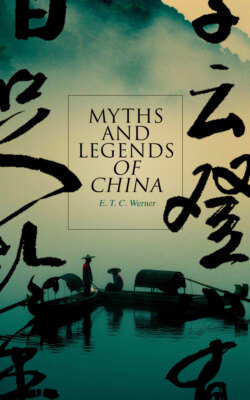Читать книгу Myths and Legends of China - E. T. C. Werner - Страница 29
На сайте Литреса книга снята с продажи.
Habits and Customs
ОглавлениеAt intervals during the year the Chinese make holiday. Their public festivals begin with the celebration of the advent of the new year. They let off innumerable firecrackers, and make much merriment in their homes, drinking and feasting, and visiting their friends for several days. Accounts are squared, houses cleaned, fresh paper 'door-gods' pasted on the front doors, strips of red paper with characters implying happiness, wealth, good fortune, longevity, etc., stuck on the doorposts or the lintel, tables, etc., covered with red cloth, and flowers and decorations displayed everywhere. Business is suspended, and the merriment, dressing in new clothes, feasting, visiting, offerings to gods and ancestors, and idling continue pretty consistently during the first half of the first moon, the vacation ending with the Feast of Lanterns, which occupies the last three days. It originated in the Han dynasty 2000 years ago. Innumerable lanterns of all sizes, shapes, colours (except wholly white, or rather undyed material, the colour of mourning), and designs are lit in front of public and private buildings, but the use of these was an addition about 800 years later, i.e. about 1200 years ago. Paper dragons, hundreds of yards long, are moved along the streets at a slow pace, supported on the heads of men whose legs only are visible, giving the impression of huge serpents winding through the thoroughfares.
Of the other chief festivals, about eight in number (not counting the festivals of the four seasons with their equinoxes and solstices), four are specially concerned with the propitiation of the spirits—namely, the Earlier Spirit Festival (fifteenth day of second moon), the Festival of the Tombs (about the third day of the third moon), when graves are put in order and special offerings made to the dead, the Middle Spirit Festival (fifteenth day of seventh moon), and the Later Spirit Festival (fifteenth day of tenth moon). The Dragon-boat Festival (fifth day of fifth moon) is said to have originated as a commemoration of the death of the poet Ch'ü Yüan, who drowned himself in disgust at the official intrigue and corruption of which he was the victim, but the object is the procuring of sufficient rain to ensure a good harvest. It is celebrated by racing with long narrow boats shaped to represent dragons and propelled by scores of rowers, pasting of charms on the doors of dwellings, and eating a special kind of rice-cake, with a liquor as a beverage.
The fifteenth day of the eighth moon is the Mid-autumn Festival, known by foreigners as All Souls' Day. On this occasion the women worship the moon, offering cakes, fruit, etc. The gates of Purgatory are opened, and the hungry ghosts troop forth to enjoy themselves for a month on the good things provided for them by the pious. The ninth day of the ninth moon is the Chung Yang Festival, when every one who possibly can ascends to a high place—a hill or temple-tower. This inaugurates the kite-flying season, and is supposed to promote longevity. During that season, which lasts several months, the Chinese people the sky with dragons, centipedes, frogs, butterflies, and hundreds of other cleverly devised creatures, which, by means of simple mechanisms worked by the wind, roll their eyes, make appropriate sounds, and move their paws, wings, tails, etc., in a most realistic manner. The festival originated in a warning received by a scholar named Huan Ching from his master Fei Ch'ang-fang, a native of Ju-nan in Honan, who lived during the Han dynasty, that a terrible calamity was about to happen, and enjoining him to escape with his family to a high place. On his return he found all his domestic animals dead, and was told that they had died instead of himself and his relatives. On New Year's Eve (Tuan Nien or Chu Hsi) the Kitchen-god ascends to Heaven to make his annual report, the wise feasting him with honey and other sticky food before his departure, so that his lips may be sealed and he be unable to 'let on' too much to the powers that be in the regions above!
